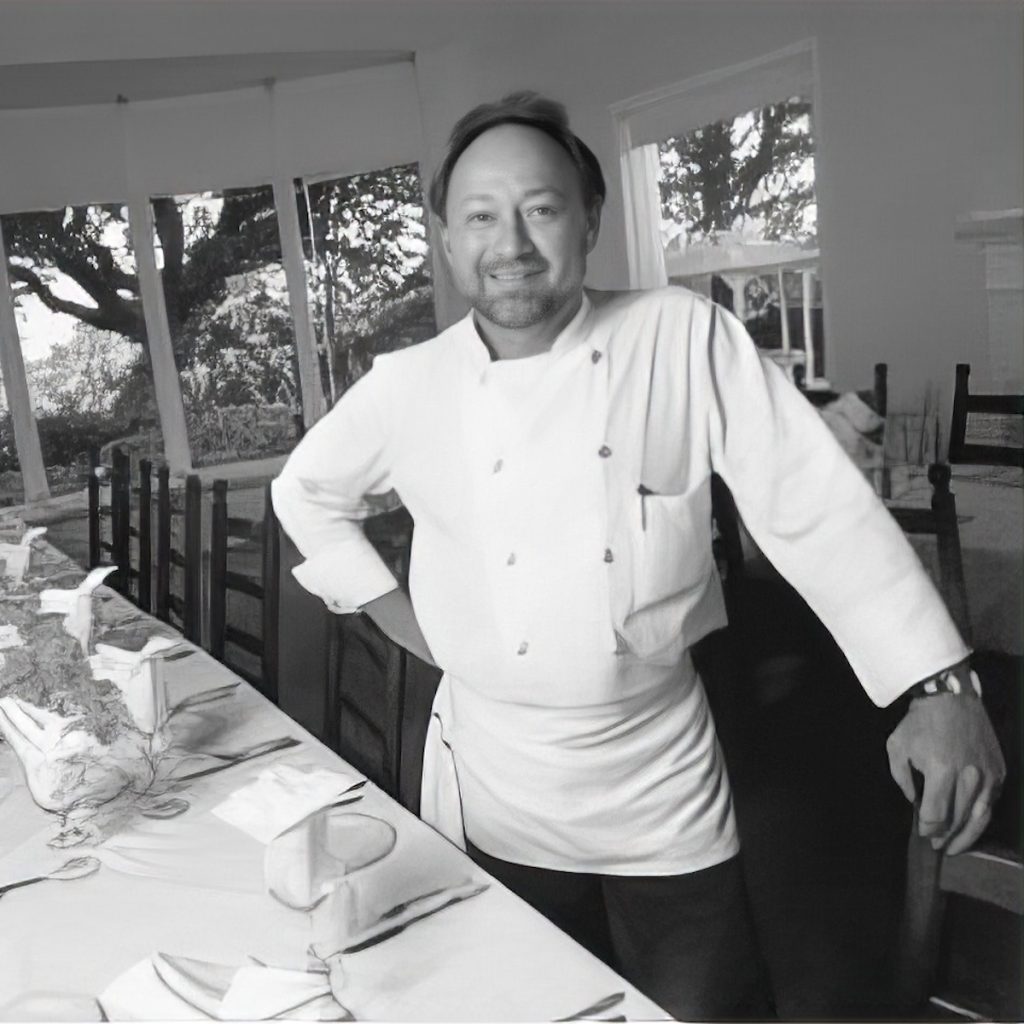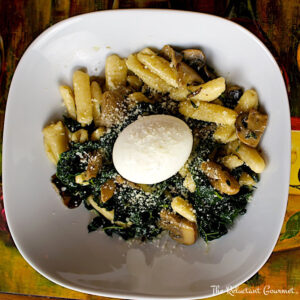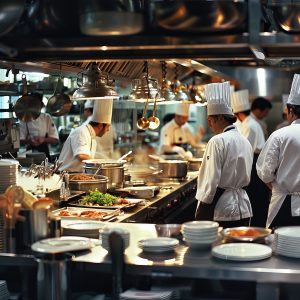Interview with Chef Jeff Huff
“It’s important to understand that once one graduates from a culinary school, their education is just beginning. “ – Chef Jeff Huff
Chef Jeff Huff is a graduate of the California Culinary Academy and has been an executive chef in some of the finest restaurants in the San Francisco Bay area. He headed up a bunch of corporate restaurants including the flag ship for SAGA Corporation in Menlo Park, CA where he created a menu of simple dishes prepared with fresh, local ingredients.
As the owner/operator of his own restaurant in the historic Bayview Hotel in Aptos called The Veranda, he was routinely acclaimed in the Zagat Review. The Mercury News consistently gave Veranda four stars for food and service.
After leaving Veranda, Chef Jeff is now managing his own business as a personal chef while teaching culinary students at the Culinary Center of Monterey (UPDATE – Closed).
I spoke with Jeff and we covered all sorts of culinary topics. I came away thinking this guy loves his work and really enjoys sharing his extensive knowledge with other people. I look forward to working more with Chef Huff on future projects.
Here’s my interview with Chef Jeff Huff:
Hi Jeff and thank you for participating in the Reluctant Gourmet’s Novice2Pro interview. When did you decide to go to culinary school at the California Culinary Academy?
Let’s see, that must’ve been about a hundred years ago….around 1987.
How did you decide on CCA?
In a former life I was pursuing a career in music but ultimately didn’t see that as being what would work as such for me in the long haul. In my travels, I happened to work with two people who were attending the relatively newly opened Academy and their descriptions of the daily experience, curriculum, instructors and all convinced me to look into this school more closely. As it turned out, for me it was a perfect fit and gave me a quantum leap into a brand new career direction.
What factors helped you in your choice? – Location, Cost, Reputation, etc
For me the most important factor was making a choice that would be a good fit. By that I mean that it was extremely important that I would be gaining marketable skill sets, knowledge base and yes, reputation from which to enhance a resume.
I wanted not only that but wanted a hands on learning experience. My instructors were very skilled European chefs, each from a different country, each with a highly decorated history. It was like being training to fly by Top Gun fighter pilots but in this situation, being trained by the best of the best in the food industry.
What would you tell someone thinking about attending culinary school to consider before making this important decision in their life?
I would highly recommend to actually visit the schools being considered, speak with a student or two and try to talk to an instructor as well. Observe the school in action and then imagine being enrolled. I would approach this much in the same way as interviewing for a job.
One should look for a good fit. We all have different personalities and career aspirations and one needs to match the educational facility that will fulfill these needs in a manner that makes the most sense to each individual.
Can you tell us about your experience at CCA? What did you enjoy most and what was your least favorite experience?
For me it was an awesome experience. Each day was like being under a waterfall of fantastic information and skill development and I soaked it up like a sponge. The CCA was in it’s infancy (I graduated with the 13th graduating class) and not the same school that bears the same name today.
It was physically located across town from where it is now. The class sizes were fairly small which translated to more individual instruction and the instructors were very focused and stern. They were a very serious, no non-sense lot and somewhat militaristic in their instruction. Coming from a military family, I was at ease with atmosphere. In a nutshell, it was the perfect school for me.
On the negative side, being born and raised here in the USA, a ‘gringo’, it took a lot at first to put up with the abusive behavior that was so natural for our instructors. It took a little while to realize that the whole system that these chefs were trained and worked in is/was worlds different that anything in this country.
What we incoming students felt was that we were being instructed by chefs who often times taught as much by intimidation as a manner of fact, didn’t care much for us but held our tuition ransom in a manner of speaking. We paid a great deal to learn, were very motivated and wanted to make the most out of the experience but the ‘my-way-or-the-hi-way’ approach did not endear us to them. After we acclimated to their style and environment, things eventually worked themselves out.
Actually, looking back at that aspect of the experience, it did tend to weed out the less serious students. I feel that those of us who stuck it out and embraced it all were much better for it.
After you graduated, you worked your way up to executive chef in some of the top-dining restaurant in the greater SF Bay area. What was this experience like?
In some ways it was a meteoric climb…tremendously challenging times, hard work, long hours and occasionally being in the right place at the right time and at times being offered/taking positions of responsibility that were stretching my abilities to my limits. Looking back it seems like it all happened so fast, but the reality of it was that it was just like what we all learned very early on. If one is dedicated to excelling and willing to work hard, good things follow.
For me, working under pressure, long hours, repetitive skills perfected my technique in production. Having the instruction to be creative yet sensible gave me a foundation to write menus that worked well because they were well thought out prior to execution. Also, working in high volume corporate restaurants taught me to be disciplined personally and professionally and the value of building a strong sense of team work, then surround myself with great teams.
In those days the phenomenon of a chef celebrity was first making a big splash. Corporations, hotels and clubs were paying attention to this and hiring for kitchen leadership (or front of the house managers) from culinary institutions was the mantra. It was exciting embarking on this as my newly found career often in the presence of star status chefs.
Was there one chef you mentored under who made a profound contribution to your career?
Not so much a chef as much as the owner of Le Mouton Noir for whom I worked as Chef de Cuisine. He is a very well traveled gentleman, a keen businessman and has the talent to turn everything he touches to gold. I learned so much from my interaction with him. Through my interaction with him I learned so much about the art of taste and sensibility, being a gracious but no nonsense business operator.
As an executive chef, what were you looking for when hiring graduates from culinary school?
I always look for professionalism in any individual. I look for a professional attitude with a hunger to continue to want to learn AND one who is trainable. Very often a culinary graduate will look the part, speak the part but have an attitude that they are above it all and aren’t open to learning the ways of whatever business venue I may be operating.
It important to understand that once one graduates from a culinary school, their education is just beginning. The school provides the foundation for the skills needed in the future. The first several positions the student holds are hugely important to develop and perfect these skills. Often times, repetition is the key to making that happen.
Are there specific traits that you found essential to achieve success?
These are so fundamental: embed in your DNA an attitude that is –
• Professional
• Respectful
• Dedicated
• Hardworking
• Plan your work / work your plan (have a one year, five year and ten year plan and stick to it)
• Look the part, dress for success. This may at first seem trivial, but we often times limit ourselves by how we take care of ourselves. One’s appearance is a reflection on work, our attention to detail in work, the care for our own work and our respect for our business and customers.
So based on your years of experience, what would you say to a high- school student thinking of becoming a professional cook? What advice would you give him or her?
Do your own homework. Work in the industry whenever possible, during school holidays, nights, weekends or during summer vacation. Get exposed to the environment, the pace. There is no better way to know than by actually trying it out before you commit to a culinary school.
By this I don’t mean to burn the candle at both ends and let your scholastic experience deteriorate at the expense of going to school AND working. Rather, when possible, get a position at a local restaurant, hotel or golf club and just get a feel for what it’s like.
I am a huge believer that more families, especially with two working parents, could benefit by working with a personal chef. You have your own personal chef business so what would you say are the most important benefits of hiring a personal chef?
For the client, quality of life issues are key. With busy schedules, pressure from work and the many needs of family life, freeing up time to do those things dear to us all is a very valuable commodity. I am also surprised to see how many people are either intimidated by cooking or get into a rut.
Along with operating your own personal chef business, you are teaching “the next generation of culinarians” at the Culinary Center of Monterey? How did you make this transition?
I actually left my position working for a local broadline distributor to get back into the kitchen, so to speak, when I got a call from Culinary Center of Monterey. The owner is also an alumni of California Culinary Academy. Timed with launching my own business I found a position to teach at the Culinary Center. At this point in my career I wanted to do something different yet stay in the industry. I wanted the opportunity to ‘give back’ and offer my experience for the benefit of the students I am honored to instruct.
What do you enjoy most about being a culinary school instructor?
What’s not to love? ? I get paid to do what I love to do for a very motivated group of people that want to hear all that I have to offer! ?
Seriously, I have always loved to share ideas, skills and such with anyone interested in culinary matters. I have been in this business for about thirty years now and have learned some very cool things that I want to share and this is the perfect venue to do just that.
I’m sure many of you students, like home cooks who visit my site, make mistakes when they first arrive at school. What top 5 mistakes do you see non professional cooks make and how can they prevent them?
Hmmm, well in no particular order:
- Being impatient, or rushing to learn something new (it’s better to go slow at first and get it right than going fast and doing something ‘almost right’)
- Not fully reading and understanding a recipe before trying to produce it. Take the time to learn all of the steps, how and why they relate to each other before beginning preparation. I don’t know how many times I teach a student how to make a particular pastry, for example, and they rush to assemble something delicate like genoise, proudly put it together – last step first and first step last – only to have forgotten to pre-heat a stove and line a baking pan and then get disappointed that it didn’t work.
- Not paying attention to the basics in food preparation (the affects of time, temperature and order in which things are supposed to be done) Take the time to learn the basics about food preparation, classic cuisine, food safety early on in your studies.
- Getting frustrated when making something for the first time and not having it turn out as expected (by a pro who has put in the time to perfect a technique) Practice, practice and practice some more. There is no substitute for repetition to develop perfection.
- Spending a fortune on cutlery before learning how to use it. – Knife skills are huge in this industry and there are a gazillion choices in the hardware available. Learn to hold a knife properly, cut precisely and maintain a sharp edge well. With the plethora of choices available, take the time to learn the skills before sinking a fortune in knives that may well not need to be spent.
A lot of my readers tell me they are in a cooking rut and are tired of cooking the same 5 or 6 meals day after day. What advice would you offer them?
These days we have the awesome tool of the internet, the Food Network TV series, and an endless supply of books and magazines. I would suggest to find something that gives you the “wow” factor then start searches that relate to that. Going out to a restaurant that has been reviewed as one with a talented chef and get inspired by some of the dishes produced on their menu. Get the juices flowing and the rest will follow.
What 5 cookbooks would you recommend every home cook own and what can they learn from them?
- Joy of Cooking – the basics of anything food related.
- The Larousse Gastronomic – the encyclopedia of sorts of anything culinaire
- The Beautiful Cookbook Series (America the Beautiful, Tuscany…, Pacific Northwest…, etc. – Collins Publishers San Francisco) for international and regional cuisines and their histories
- The Time Life series – for the basic of food preparation, breads, seafood, pastries and candies, etc.
- The Moosewood and The Silver Palate series – I know, that’s six, but these offer great ideas for flavor combinations and delicious vegetarian offerings.
Let’s shift gears and talk about a little about cooking at home. After a week of working long hours around some incredible food, what do you like to prepare at home when cooking is not your job?
I never tire of cooking, ever. Really, that’s true for me. But at home, I love simple and or quick things. I enjoy the myriads of things I prepare from the lowly bar-b-que to a quick sauté-single dish creation to a braised comfort item that practically takes care of itself.
Do you have a signature dish or favorite recipe? And if so, can you share it with us?
Hmmm, there is a fantastic recipe for salmon that I absolutely love:
Brine salmon filets in a solution of salt , sugar, and water (about ½ cup each of salt and sugar per 2 cups of water) for about 30 minutes, then remove and allow to dry in refrigeration for another 30 minutes. At this point it is still raw. To finish, dust with flour, pan sear, and bake or bake in a bar-b-que.
Serve with the sauce of beardaise, new potatoes, and seasonal vegetables.
The flavors are to die for, and one can be endlessly inventive in its presentation.
Thank you again, Chef, for this interview. If there are any questions I missed or anything you would like to comment on, please do.
It is my pleasure to be a part of your efforts. You have a pretty comprehensive list of questions, and as I get a moment or two this week, I’ll possibly offer a few more questions that can help the curious by asking what is important in making decisions about things involving the hospitality industry.















